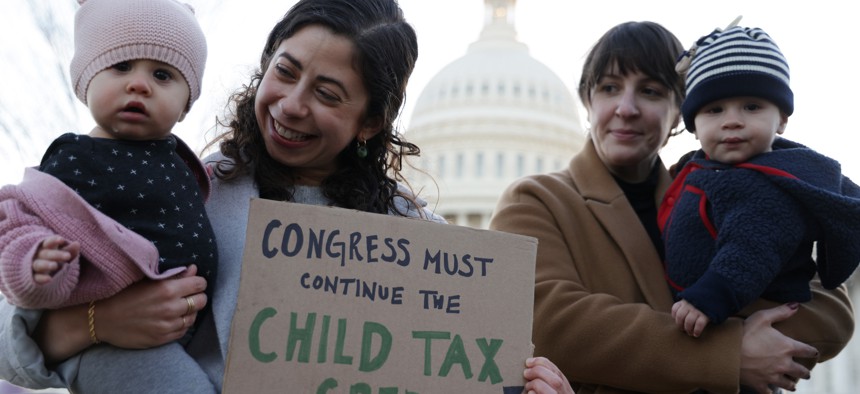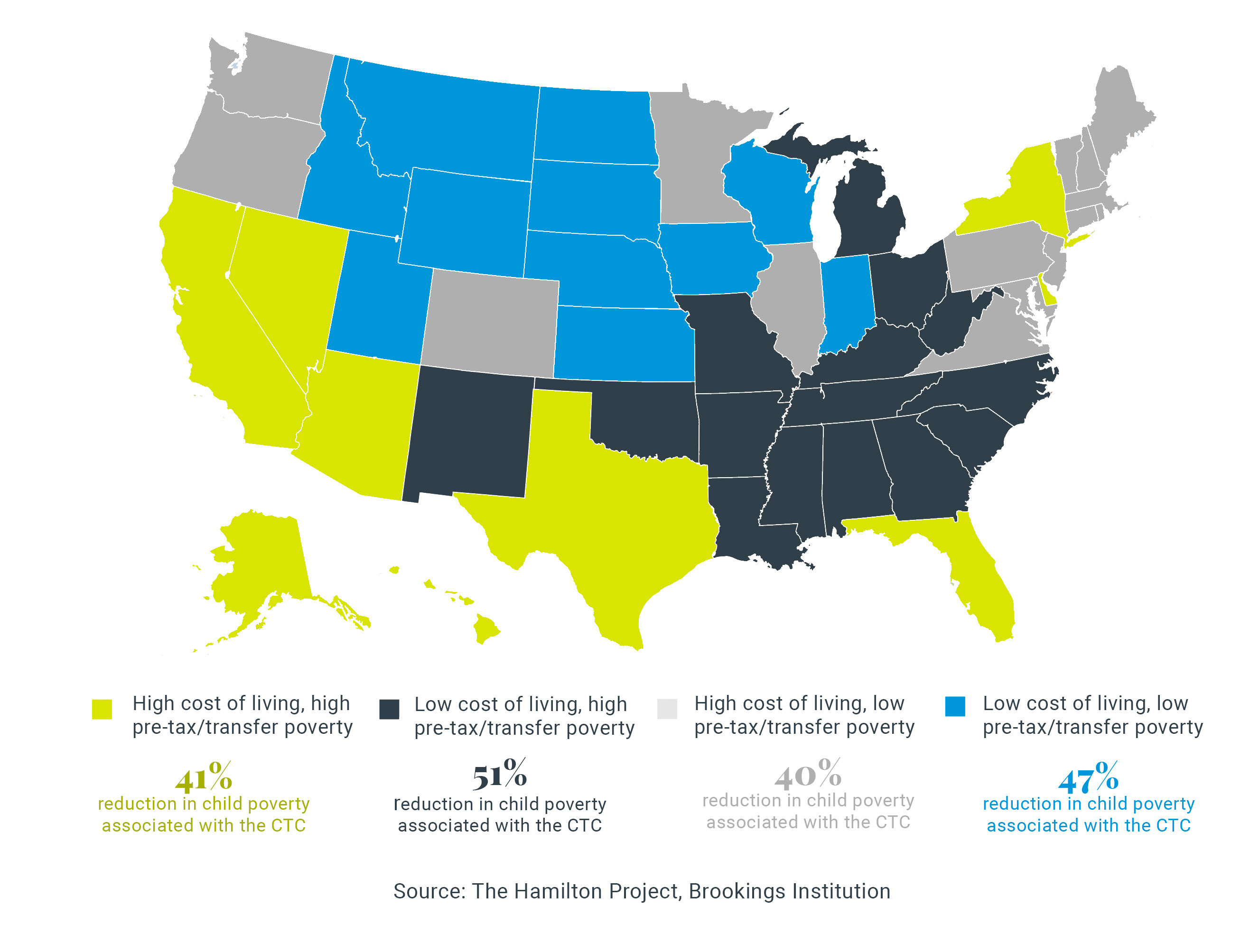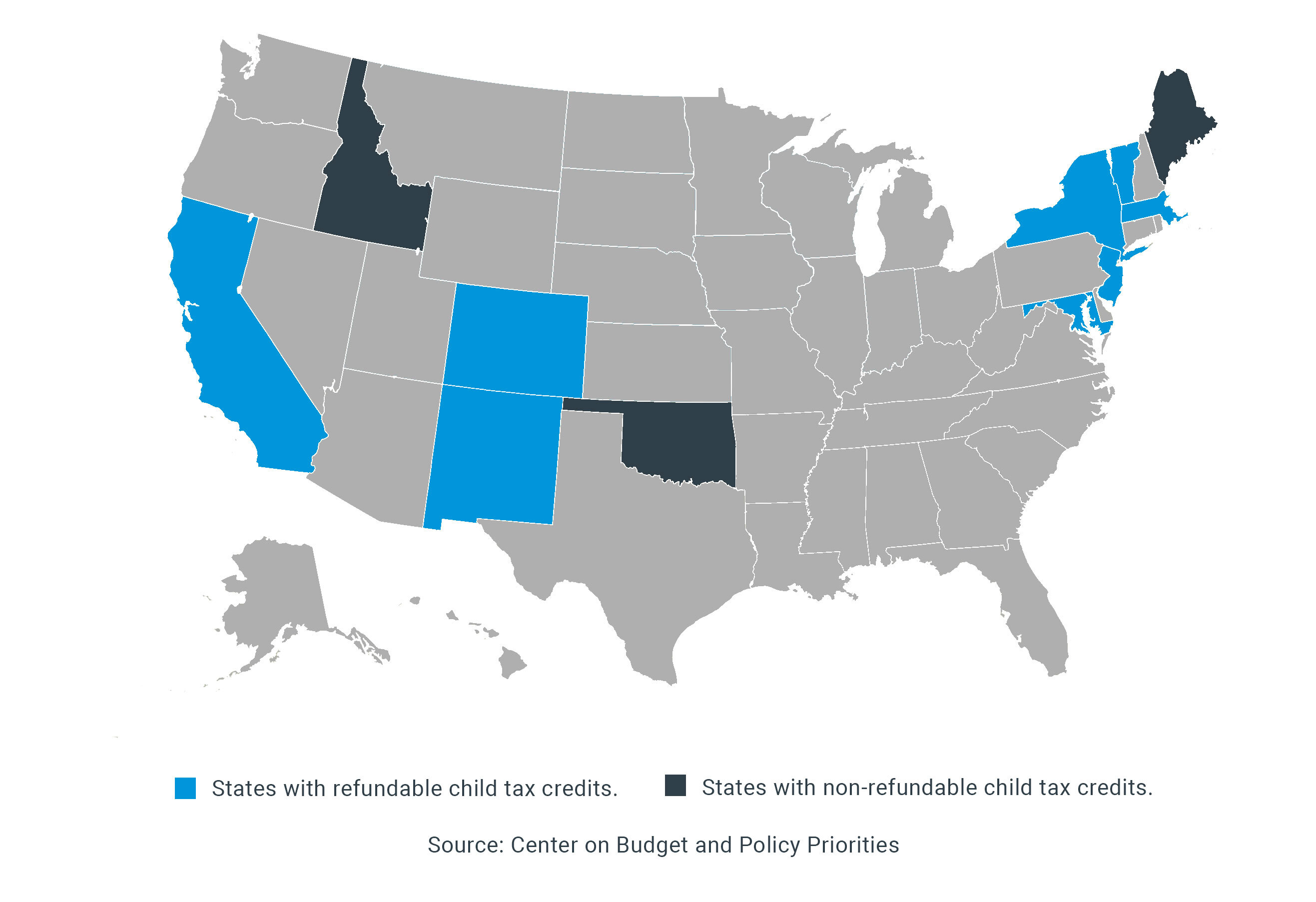State & Local Roundup: The Child Tax Credit Gets a Boost

Alex Wong via Getty Images

Connecting state and local government leaders
President Biden this week proposed bringing back the 2021 expanded credit amidst moves by states to enact their own. Plus: A red state pot rebuke; Tennessee restricts Nashville’s city council; Boston transit troubles; and more news you can use from around the country.
You're reading Route Fifty's State and Local Roundup. To get the week’s news to use from around the country, you can subscribe here to get this update in your inbox every Friday.
It’s Friday, March 10, and we’d like to welcome you to the weekly State and Local Roundup. This week, the child tax credit got a boost. Fighting child poverty is already a top priority for many state and local officials, and the credit is seen as a crucial way to support households in their communities.
In his budget proposal yesterday, President Biden called for bringing back the higher tax credits—to $3,600 from $2,000 for children under 6 years old and to $3,000 for kids ages 6 to 17.
In the proposal, Biden noted that increasing the tax break cut child poverty in half in 2021—“the lowest level in history.”
According to a report released last week, while a temporarily expanded child tax credit during the Covid-19 pandemic resulted in a record-low child poverty rate, some states saw bigger decreases than others.
The 2021 expanded credit slashed child poverty in half across southern states, according to the Brookings Institution. In general, the report noted, states with a low cost of living and high poverty rates saw the greatest reductions because these states tend to have weak public safety net programs.

The analysis grouped states into four categories based on the cost of living and poverty rates calculated before taxes and public benefits. States with high costs of living and low poverty rates, including in New England and the Pacific Northwest, saw the smallest reduction. But even among that group, child poverty dropped significantly by about 40%.
For states with high poverty rates and high costs of living—including California, New York and Texas—the share of children in poverty dropped 41%. That figure jumped to 47% for states with low costs of living and low poverty rates, which includes much of the Midwest.
The tax credit also had the most impact in states with large shares of historically vulnerable demographics, including single mothers, rural families and Black communities.
Many lauded the expanded child tax credit as the driving factor behind the country’s record low child poverty rate of 5.2% in 2021, down 46% from the year before. In addition to increasing the credit, the policy also eliminated earning requirements and included children who are 17.
Since the policy’s termination, researchers have continued to look at how states could enact or improve their own child tax credits to lift more children out of economic hardship. Currently, 11 states have child tax credits.

In November, the Institute of Taxation and Economic Policy found that most states could reduce child poverty by 25% or more by enacting a $2,000 refundable child tax credit with an additional 20% for children under 6. While states may not be going so far as the institute recommended, there’s certainly movement on the child-tax front.
Last week the Utah Legislature sent Gov. Spencer Cox a measure that would give some families up to $1,000 in child tax credits for children between 1 and 3.
Meanwhile, New Jersey Gov. Phil Murphy proposed a budget with a child tax credit of $1,000 for children aged 6 and under (effectively doubling the existing credit), while Massachusetts Gov. Maura Healey is pushing a $600 credit for kids under 13.
In a slightly different approach, Ohio Gov. Mike DeWine this week proposed in his budget a $2,500 tax deduction for parents.
Make sure to come back here every Friday for the week’s highlights. If you don’t already and would prefer to get it in your inbox, you can subscribe to this newsletter here. Have a great weekend.
News to Use
Trends, Common Challenges, Cool Ideas, FYIs, and Notable Events
- Red state pot rebukes. Oklahoma voters gave a resounding "no" to legalizing recreational marijuana sales this week, striking a blow to efforts to expand the industry beyond the state’s five-year-old medical marijuana framework. More than 61% of voters rejected the measure. With the vote, Oklahoma joins a number of conservative states—including Arkansas, North Dakota and South Dakota—whose voters have recently decided against recreational marijuana legalization.
- California flooding risks. With back-to-back storms projected to hit California in the coming days, state officials are scrambling to prevent a repeat of the flooding that killed nearly two dozen people in January. They’re hoping that releasing water from certain reservoirs ahead of time will prevent rivers from overflowing. At least 10 rivers are forecast to overflow from the incoming “Pineapple Express” storm that is hitting parts of the state into Saturday. The storm comes as mountain communities in the state are still digging out from historic snowfalls in recent weeks.
- Police abuse in Louisville. Attorney General Merrick Garland said this week the Louisville police department "has practiced an aggressive style of policing that it deploys selectively, especially against Black people, but also against vulnerable people throughout the city." His remarks came as the Justice Department released the results of a nearly two-year "pattern or practice" investigation into Louisville Metro Police prompted by the 2020 police killing of Breonna Taylor. The city's police department has agreed in principle to negotiate a consent decree with the Justice Department.
- Boston transit troubles. MBTA, the Boston-area transit agency, announced that its Red, Orange, Blue and Green lines immediately will operate at speeds of 10-25 mph “out of an abundance of caution.” The decision comes after an inspection this week found multiple trains “overshooting” station platforms, defective third rail insulators and poor track conditions. It’s the latest setback for the beleaguered agency, which is under federal scrutiny for repeated safety problems. The MBTA also announced this week that it will have to dip further into its reserves to balance its fiscal year 2024 budget to make up for a significant dip in ridership. Last month, the agency said it wouldn’t roll out its automated fare payment system in 2024, a project that is already three years behind schedule and $212 million over budget. To top it off, MBTA is having trouble recruiting a general manager.
- Walgreens abortion controversies. Gov. Gavin Newsom said California will no longer do business with Walgreens after the company’s decision to stop selling abortion medication in 20 states. Newsom’s action is his latest attempt to counter GOP efforts to limit reproductive rights. But Walgreens isn’t just facing the ire of liberal states. The decision is also causing division in red states such as Alaska, where lawmakers are upset with the attorney general for trying to limit access to mifepristone.
- Tennessee vs. Nashville. Tennessee Gov. Bill Lee signed a bill Thursday to slash the size of the Nashville Metro Council just hours after Tennessee Senate Republicans passed it. The move is widely seen as retaliation against the city for blocking a bid by Republicans to host the 2024 Republican National Convention in Nashville. The bill would require city and metropolitan governments to cap their councils at 20 members. Although the legislation doesn't directly name Nashville, bill sponsors acknowledged that, in practice, Nashville would be the only local government in the state affected by the legislation. Legal challenges are likely.
- Gun law battles. A federal judge struck down a Missouri law this week that declared several federal gun laws “invalid,” handing the Justice Department a victory in its bid to get the laws tossed out. The Illinois Supreme Court is moving quickly to review the constitutionality of the state’s new assault weapons ban, after a downstate judge declared it illegal last week. A federal appeals court also heard a challenge to the law this week. Meanwhile, the fate of California’s gun laws may hinge more on obscure history than modern concerns about the dangers of firearms, according to the Los Angeles Times.
- Transportation governor? Louisiana Gov. John Bel Edwards, the state’s outgoing Democratic governor, backed his transportation secretary in a bid to succeed him. Edwards endorsed Shawn Wilson, who is the only major Democrat in this year’s gubernatorial race, citing Wilson’s ability to bring “people together to accomplish the most difficult tasks.” Wilson previously served as the first Black president of the American Association of State Highway and Transportation Officials, where he prioritized diversity in the transportation industry.
Picture of the Week
Here’s a trio of bear cubs being sleepy.
— Michigan Department of Natural Resources (@MichiganDNR) March 6, 2023
Oh…this post is on Twitter so 50/50 you actually see it today. pic.twitter.com/xy9WHzW6TL
As bears nationwide emerge from hibernation, we thought we’d leave you with this little gem out of Michigan. States from Colorado to Massachusetts have been capturing grizzly and black bear sightings as the animals shake off months of sleep. In Massachusetts this week, state wildlife officials warned Bay Staters to remove bird feeders and other potential food sources from their yards to help keep bears out of neighborhoods. “The big issue is they’re very hungry after not eating for 4 to 5 months,” Dave Wattles of the Massachusetts Division of Fisheries and Wildlife, told the Boston Herald on Thursday.
Government In Numbers
16
The number of states that have codified through legislation the use of campaign funds for child care, according to the Vote Mama Foundation, a nonpartisan research and advocacy nonprofit that seeks to erase the barriers women face when running for office. Politico recently reported that state legislators are increasingly introducing bills that would allow campaign funds to be used for child care. This year alone, lawmakers in Arizona, Florida, Georgia, Hawaii, Iowa, Kansas, Massachusetts, Nevada, Oklahoma, Tennessee and Texas have introduced such bills.
ICYMI
Here’s What’s In Biden’s Budget Plan for State and Local Governments
The administration, among other things, wants to dramatically increase funding for housing and restore the child tax credit.
BY KERY MURAKAMI
State and Local Officials Press to Increase Rail Safety Regulations
They want railroads to tell local emergency responders if hazardous materials are going through their towns, and have asked the feds to study the proliferation of longer trains.
BY DANIEL C. VOCK
Democrats Plan to Take Another Pass at Cannabis Banking Bill
They are hoping a bill sponsored by Democratic and Republican senators will be more successful and finally address local governments’ concerns about crime.
BY KERY MURAKAMI
Colorado Expands Unemployment Insurance—And Others Are Watching Closely
Colorado’s low-cost approach to getting benefits out the door quickly could provide a model for adapting or modernizing public assistance programs elsewhere.
BY LIZ FARMER
White House’s Environmental Justice Tool Still Comes Up Short, Advocates Say
Groups worry that the criteria that determines which communities qualify is too broad and may lead to federal grant money bypassing the people who need it most.
BY DANIEL C. VOCK

NEXT STORY: Here’s What’s In Biden’s Budget Plan for State and Local Governments


